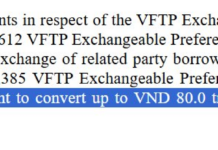Fear of salary increase and “soaring prices”
The National Salary Council has proposed that the Government increase the regional minimum wage in enterprises by an additional 6% per month, averaging 238,000 VND from July 1.
The proposed monthly minimum wage increase ranges from 200,000-280,000 VND depending on the region. If approved, the minimum wage in region 1 would increase to 4.96 million VND; region 2 would be 4.41 million; region 3 would be 3.86 million; and region 4 would be 3.45 million. The current wages in these regions range from 3.25-4.68 million VND.
If the increase in the regional minimum wage is implemented from July 1, it will be synchronized with the public sector salary reform.
Specifically, from this date, civil servants, officials, armed forces, and pensioners will officially apply the new salary increase.
In particular, the basic salary for civil servants and officials will be adjusted to 1.8 million VND/month, equivalent to an increase of 20.8% compared to the current level. Pension payments will also be adjusted by 12.5% and 20.8% for many individuals.
Salary increases bring great joy to workers, but an issue of concern to many is whether prices will increase alongside wages.
Nguyen Thi Mai (40 years old), a worker at an electrical equipment manufacturing company in Thang Long Industrial Park (Hanoi), shared that the 6% increase in the minimum wage from July 1 is not of great value to her as the increase is low. Meanwhile, her actual wage is already higher than the minimum wage in the region.
 (Illustrative photo: Le Anh Dung) |
What worries workers like Mai is that every time the wage increases, prices also increase, especially for essential goods.
“Increasing wages to compensate for price hikes and ensure workers’ livelihoods, but when wages have not increased, essential goods have already started to increase. If the government does not have price control policies, the lives of those who rely on wages will become more difficult,” said Mai.
Le Dinh Sam (64 years old), a retired health official, said that according to the roadmap from July 1, pensions will be adjusted and increased. With the current pension of 6 million VND/month, if adjusted with an additional 8% (according to the proposal of the Social Insurance of Vietnam), from July, Sam will receive nearly 6.5 million VND per month.
According to Sam, this additional increase is only valuable when the prices of essential goods such as food (rice, meat, vegetables) and living expenses (fuel, electricity, water…) are controlled.
“Market prices always rise faster than workers’ wages, especially pensions and salaries of civil servants. When wages increase by only one unit, prices increase by 2-3 times, making life harder. Therefore, the government needs stable price policies to make salary increases meaningful for workers,” said Sam.
Controlling prices from rising too high
According to economist Ngo Tri Long, prices and wages are closely related. When wages increase and commodity prices stabilize, then the new wage increase becomes valuable to workers. Therefore, the government must control inflation, especially the prices of essential goods.
Labor and wage expert Pham Minh Huan (former Deputy Minister of Lbor, Invalids and Social Affairs) also noted that wage adjustments are made based on the consumer price index (CPI). In reality, price increases following wage adjustments have been more limited compared to previous adjustments.
In the past, goods were scarce. When basic wages increased, goods would “follow the trend” by raising prices. However, today some goods increase in price while others decrease, and the government is making efforts to control inflation.
In fact, the Government has set out a number of tasks and key solutions to control inflation.
In particular, the Steering Committee for Price Management has directed ministries and sectors to closely coordinate to implement cautious, reasonable, and proactive price management policies that closely monitor market developments; regularly assess and forecast to make appropriate adjustments; and contribute to ensuring inflation control in accordance with the target.
Specifically, attention is paid to establishing and calculating dosage and timing for adjusting prices of goods and services managed by the state (electricity, healthcare, education services) in line with the inflation control objective.
In addition, early notification of the roadmap for price adjustments is also important to avoid passive policy coordination.
The Government also requires ensuring smooth operation of supply, circulation, and distribution of goods and services, especially for petroleum and strategic goods that may be affected by disruptions in the global supply chain…
Ready and timely intervention plans are also in place to stabilize the market appropriately when unexpected shocks occur.
Vu Diep





































